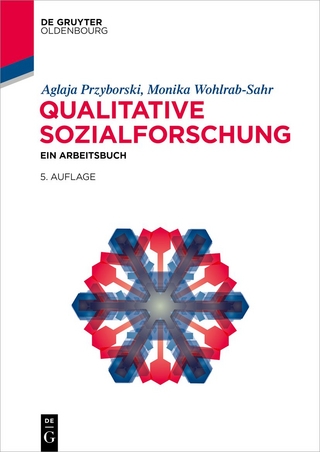
The Palgrave Handbook of Institutional Ethnography
Springer International Publishing (Verlag)
978-3-030-54221-4 (ISBN)
A comprehensive guide to the alternative sociology originating in the work of Dorothy E. Smith, this Handbook not only explores the basic, founding principles of institutional ethnography (IE), but also captures current developments, approaches, and debates. Now widely known as a "sociology for people," IE offers the tools to uncover the social relations shaping the everyday world in which we live and is utilized by scholars and social activists in sociology and beyond, including such fields as education, nursing, social work, linguistics, health and medical care, environmental studies, and other social-service related fields. Covering the theoretical and methodological underpinnings of IE, recent developments, and current areas of research and application that have yet to appear in the literature, The Palgrave Handbook of Institutional Ethnography is suitable for both experienced practitioners of institutional ethnography and those who are exploring this approach for the first time.
Paul C. Luken is Associate Professor Emeritus in sociology at the University of West Georgia, USA, where he taught graduate-level courses on IE. He has helped to draw together IE scholars in multiple contexts, from special issues of journals such as The Journal of Sociology and Social Welfare , to the co-founding of the Institutional Ethnography Division of the Society for Study of Social Problems and the ISA Thematic Group on Institutional Ethnography of the International Sociological Association. Suzanne Vaughan is Associate Professor of Sociology in the School of Social and Behavioral Sciences at Arizona State University, USA. She is known internationally for her innovative application of institutional ethnography to housing studies, and has served on the Editorial and Publication Board of the IE Division of the Society for Study of Social Problems and as secretary/treasurer in the Thematic Group on IE of the ISA.
Chapter 1: Introduction / Institutional Ethnography: Sociology for Today, Paul C. Luken .- Part 1: Exploring Historical and Ontological Foundations.- Chapter 2: Elements of an Expansive Institutional Ethnography: A Conceptual History of its North American Origins, Marjorie L. Devault.- Chapter 3: Materialist Matters: A Case for Revisiting the Social Ontology of Institutional Ethnography, Liza McCoy.- Chapter 4: Teaching Institutional Ethnography as an Alternative Sociology, Eric Mykhalovsky, Colin Hastings, Leigha Comer, Julia Gruson-Wood, and Mathew Strang.- Chapter 5: Exploring Institutional Words as People's Practices, Dorothy E. Smith.- Part 2: Developing Strategies and Exploring Challenges.- Chapter 6: Mapping Ruling Relations: Advancing the Use of Visual Methods in Institutional Ethnography, Nikole K. Dalmer.- Chapter 7: Discovering the Social Organization of Perinatal Care for Women Living with HIV: Reflections from a Novice Institutional Ethnographer, Allyson Ion.- Chapter 8: IE and Visual Research Methods: An Open-ended Discussion, Morena Tartari.- Chapter 9: And Then There Was Copyright, Suzanne Vaughan.- Chapter 10: Invoking Work Knowledge: Exploring the Social Organization of Producing Gender Studies, Rebecca W.B. Lund.- Chapter 11: Teaching Institutional Ethnography to Undergraduate Students, Kathryn Church.- Part 3: Explicating Global/Transnational Ruling Relations.- Chapter 12: Using Institutional Ethnography to Investigate Intergovernmental Environmental Policy Making, Lauren E. Eastwood.- Chapter 13: Regulating the Duty to Consult: Exploring the Textually-Mediated Nature of Indigenous Dispossession in Chile, Magdalena Ugarte.- Chapter 14: Transnational Power Relations in Education: How it Works Down South, Nerida Spina and Barbara Comber.- Chapter 15: The Struggle for 'Survival' in Contemporary Higher Education: The Lived Experiences of Junior Academics, Li-Fang and Yu-Hsuan Lin.- Part 4: Making Change within Communities.- Chapter 16: Building Change On and Off Reserve: Six Nations of the Grand River Territory, Susan Marie Turner and Julia Bomberry.- Chapter 17: Mapping Institutional Relations for Local Policy Change: The Case of Lead Poisoning in Syracuse, New York, Frank Ridzi.- Chapter 18: The Institutional Analysis: Matching What Institutions Do with What Works for People, Ellen Pence.- Part 5: Critiquing Public Sector Management Regimes.- Chapter 19: Professional Talk: Unpacking Professional Language, Ann Christin E. Nilsen.- Chapter 20: The Frontline Interpretive Work of Activating the Americans with Disabilities Act, Eric Rodtiguez.- Chapter 21: Contested Forms of Knowledge in the Criminal-Legal System: Evidence-Based Practice and Other Ways of Knowing among Frontline Workers, Nicole Kaufman and Megan Welsh.- Chapter 22: Public Protection as a Ruling Concept in the Management of Nurses' Substance Use, Charlotte A. Ross.- Chapter 23: Producing Functional Equivalency in Video Relay Service, Jeremy L. Brunson.- Part 6: Bringing Together Different Approaches and Perspectives.- Chapter 24: Using Composites to Craft Institutional Ethnographic Accounts, Michael Corman.- Chapter 25: Attending to Messy Troubles of the Anthropocene with Institutional Ethnography and Material Semiotics: The Case for Vital Institutional Ethnography, Karly Burch.- Chapter 26: Institutional Ethnography for Social Work, Gerald de Montigny.- Chapter 27: Institutional Ethnography and Youth Participatory Action Research: A Praxis Approach, Naomi Nichols and Jessica Ruglis.
| Erscheinungsdatum | 17.12.2020 |
|---|---|
| Zusatzinfo | XXII, 561 p. 27 illus., 15 illus. in color. |
| Verlagsort | Cham |
| Sprache | englisch |
| Maße | 155 x 235 mm |
| Gewicht | 988 g |
| Themenwelt | Sozialwissenschaften ► Soziologie ► Empirische Sozialforschung |
| Schlagworte | Epistemology • everyday world • feminist framework • Materialist • problematics of social research • Public Sociology • Ruling relations • social organization of knowledge • Social relations • textual mediation |
| ISBN-10 | 3-030-54221-1 / 3030542211 |
| ISBN-13 | 978-3-030-54221-4 / 9783030542214 |
| Zustand | Neuware |
| Haben Sie eine Frage zum Produkt? |
aus dem Bereich


